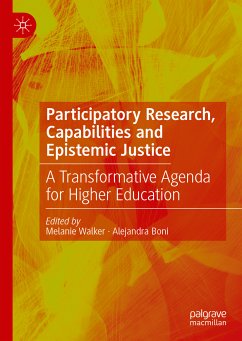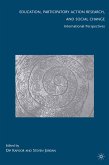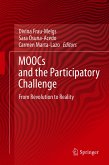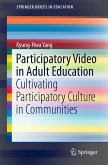"This marvellous collection assembles a set of highly insightful essays that blend the capability approach and participatory action research in order to fight epistemic injustices in higher education contexts. Highly congenial to Freirean pedagogy, the collection vividly demonstrates the epistemic and emancipatory power of participatory knowledge production from below."
-Julian Culp, The American University of Paris, France
"This is a splendid book which makes a significant, important and original contribution to the broad field of education and social justice. It successfully brings together the concepts of epistemic justice, participatory research and capabilities formation in eight exciting cases of substantial projects which involve participants who have been traditionally silent or silenced in different global contexts."
-Monica Mclean, University of Nottingham, UK
Melanie Walker is Distinguished Professor in the Centre for Development Support at the University of the Free State, South Africa, and holds the South African Research Chair in Higher Education and Human Development. Her research interests focus on social justice and human development in higher education in the global South.
Alejandra Boni is Professor at the Universitat Politècnica de València, Spain and Deputy Director of Ingenio (CSIC-UPV). Her research interests focus on human development, higher education, global citizenship and transformative innovation.
Dieser Download kann aus rechtlichen Gründen nur mit Rechnungsadresse in A, B, BG, CY, CZ, D, DK, EW, E, FIN, F, GR, HR, H, IRL, I, LT, L, LR, M, NL, PL, P, R, S, SLO, SK ausgeliefert werden.
"This wide-ranging edited volume by Melanie Walker and Alejandra Boni beautifully captures the potential for university-based participatory action research (PAR) to influence epistemic spaces in the wider community. Moreover, and perhaps most interestingly, it does so by invoking the insights of the capability approach. ... The editors deserve to be congratulated for this collection of essays that lend both depth and breadth to the book. ... The 10 chapters in this excellent volume help us understand why." (Stacy J. Kosko, Journal of Human Development and Capabilities, Vol. 23 (1), 2022)
Es gelten unsere Allgemeinen Geschäftsbedingungen: www.buecher.de/agb
Impressum
www.buecher.de ist ein Internetauftritt der buecher.de internetstores GmbH
Geschäftsführung: Monica Sawhney | Roland Kölbl | Günter Hilger
Sitz der Gesellschaft: Batheyer Straße 115 - 117, 58099 Hagen
Postanschrift: Bürgermeister-Wegele-Str. 12, 86167 Augsburg
Amtsgericht Hagen HRB 13257
Steuernummer: 321/5800/1497
USt-IdNr: DE450055826









